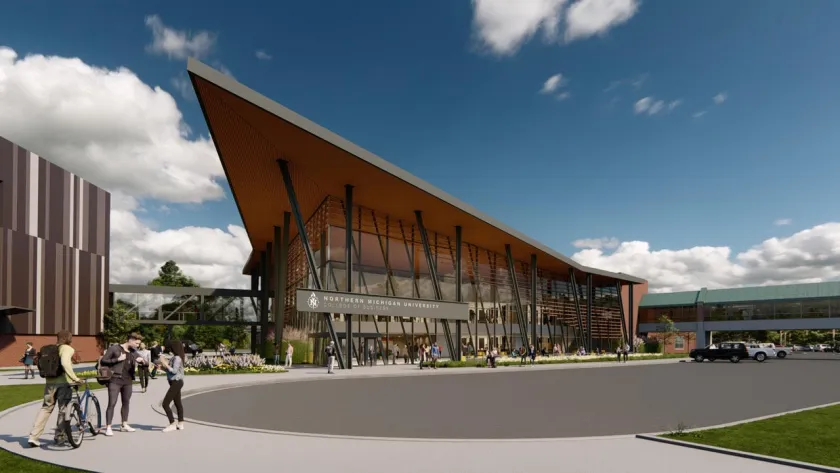Northern Michigan University will receive $13.4 million in state funding toward construction of a $19.1 million Northern Enterprise Center to house the College of Business and serve as a catalyst for workforce, economic and community development across the Upper Peninsula and beyond. The university's top strategic facilities priority was included in the supplemental appropriations bill signed today by Gov. Gretchen Whitmer.
The Northern Enterprise Center will provide new and dynamic learning, teaching, business-creation, innovation and office space for the College of Business, and is designed to help propel the college's continued growth.
"My faculty and I are thrilled with the news of capital outlay funding for a College of Business space,” said Dean and Department Head Carol Johnson. “This appropriation will benefit our students and enable the college to deliver a state-of-the-art business education and programming. It is transformational."
NMU President Brock Tessman said the project is part of an overall Campus Master Plan initiative to centrally locate popular academic programs, reduce net square feet through the future demolition of Gries Hall, and to reduce NMU's carbon footprint and operating costs. The facility will also complete a link between buildings in NMU's Academic Mall, enabling students to traverse the entire area indoors in the winter.
“The Northern Enterprise Center's planned location in the heart of campus—as an addition to the C.B. Hedgcock Building—will bring students close to support operations with better access to advising, tutoring, first-generation student services and resources,” Tessman said. “It also provides greater access to faculty, whose offices are currently in Cohodas Hall, and creates opportunities for interdisciplinary collaboration with other departments. We are thankful to Governor Whitmer and the Legislature, including Rep. Jenn Hill, for their support in allowing us to move forward with this important project.”
The Northern Enterprise Center will allow for continued expansion of the College of Business' internship and work scholars programs, which enable students to get paid to learn and work while simultaneously earning academic credit. Growth in these programs helps to address the area's labor shortage. It also increases the likelihood that NMU students will seek permanent employment at the sites after graduation, benefiting the U.P. population and economy.
“Working behind the scenes with the College of Business, we have seen firsthand the dedication and passion that each member brings to the NMU campus,” said graduate assistants Rob McCormick and Jonas Vorbau in a joint statement. “The facilities and technology that support the incredible faculty and staff should act as a tool for offering the best education possible to students. Any forward-thinking organization must invest in technology and facilities that evolve with the company to meet the needs of employees and consumers alike. A space unique to the College of Business that offers improved collaborative spaces, educational spaces and current technology will be extremely beneficial to the faculty and students.”
Michigan's public universities are required to submit capital outlay requests detailing their respective priority projects to the state each year. Not all are approved. NMU Vice President for Finance and Administration Gavin Leach said, following the Governor's approval, the next phase will be programming and schematic design.
Then NMU will seek construction authorization from the Department of Technology, Management and Budget. This phase typically takes a year or more and includes approval of the construction plans as well as conveyance of property to the state for construction. Once that is completed, construction is estimated to take a year, depending on the time of year in which the authorization is provided.

